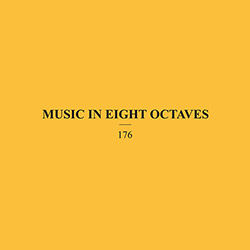
176 is the piano duo of Anthony Pateras and Chris Abrahams and the music herein was performed in 2005 while being mixed, mastered and re-mastered between 2006 and 2016. As with other Immediata releases, a booklet with a relatively lengthy conversation between the participants is included but here, except for the very end, it's more a personal history of Abrahams. Music in Eight Octaves is brought up but briefly, although the descriptors by Pateras and Abrahams are quite accurate: "stacked density", "relentlessness", "informational load" and, oddly perhaps, "stasis".
The initial impression of the 50-minute work is to recall, in a certain sense, Tom Johnson's "The Chord Catalogue", not that the piece is systematic in any way � it's not � but it has a similar monolithic, apparently impenetrable aspect. It's as if you took the stormiest moments of mid-70s Cecil Taylor, multiplied it by two, overlaid them atop each other and ran with it for almost an hour. Oh, there's a "break" every so often, as at the 14-minute mark when the lower registers are abandoned and the pair aggressively tinkle (because it is a kind of tinkling sound that eventuates) the upper reaches of the keyboard, but the music is just as dense and hyper-packed � sometimes, as here, sounding like a Conlon Nancarrow player piano run amok. Gradually, the full gamut of notes returns and we're back into the non-stop surge.
As Abrahams noted, for all the activity, one begins to have a sense of stasis, of treading water but intensely so. There's a later section that sounds as though electronically modified (though I'm not sure), where mini-conglomerations of arpeggios dart in and out of the proceedings as well as other variations. Music in Eight Octaves becomes more complex, structurally, as it proceeds. But it's possible to lose that notion of structure in the overwhelming mass of sound, which can be frustrating or exhilarating depending on one's approach. But if you allow yourself to be "thrown into" the pianos, to be buffeted about by mallets and bounced along the piano wires, it can be a thrilling, if destabilizing, experience.
Comments and Feedback:



More Recent Reviews, Articles, and Interviews @ The Squid's Ear...


|

